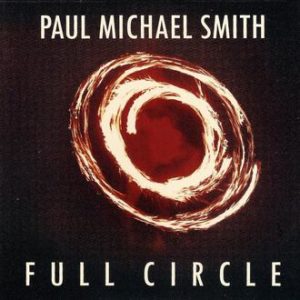 Umpf.
Umpf.
Yeah, it’s not the most technical way to describe Paul Michael Smith’s “Full Circle,” but it’s the first word, phrase or sound that comes to mind after listening to it. Your heart goes out to him because you can tell how hard he tries. Plus, as he likes to boast pretty much anywhere you find information on him, the dude writes like a billion songs a day or some such nonsense.
Well. These 11 tracks suggest that perhaps he might want to focus on the age-old adage that quality can trump quantity. Because … again. Umpf.
It starts with the set’s weirdest moment — a moment that also probably doubles as its best. “Big Daddy” eases in with worldly jazz horns that give way to a simple backbeat and tasteful acoustic guitar picking. Things take a turn, though, with Smith’s lyrical acumen — or, well, lack thereof — as he outlines a story that kind of/sort of tells the tale of a drug addict or a funeral or someone being “killed for” his “dough.” It’s so unbelievably odd that it actually half-works because of its shameless eccentricity.
From there, however, things get embarrassingly tacky. Yes. Even more tacky than, again, someone being “killed for” his “dough.”
“Real American Heroes” is a play on the unsung knights in shining armor who do outrageously noble things like pay bills and “eat peanut butter to survive.” This is all on top of your atypical coffee shop structures that come fully equipped with tambourine and easy-going acoustic guitar chords. The only saving grace is a tiny shot of backing vocal harmonies that are elevated almost entirely because of the cheese that surrounds them.
“I Do, Don’t You” plays in that same universe where Smith’s understated, overbearingly pleasant voice carries the track even if the words emanating from it sometimes veer into absurdity. “Do you think all governments are corrupt? And we have a duty to disrupt? By getting angry and erupt? You’re damn right, I do,” he proclaims in the song’s second half and … whoa, there, man. Settle down. As a song, it works in the sense that it establishes the Thurmont singer as someone who knows how to crescendo and decrescendo, but as a meditation on rhetorical questions, it’s nothing short of a disaster.
Things don’t improve when Smith decides to plug in and offer up what limited electric guitar skills he has. “I Love You All Over” is just a tiny bit creepy with how unapologetically explicit the singer is with his language. In some ways, it works as a low budget college radio single from 1987, but even that’s a stretch. The band isn’t tight, the spine isn’t creative, and the so-called emotion Smith is attempting to convey when he shouts “baby” is cringeworthy in its perversion.
So what’s good? Not much. But “Zorro (The Street Troubadour)” takes tiny cues from Simon & Garfunkel with its inoffensive aesthetic and street angel mentality. Plus, the background noises add a fun effect that proves this is a guy who cares about detail. And “Button My Buttons” is a sweet idea, if nothing else. Throughout it, the singer outlines the latter half of a life where companionship is valued and friendship is the currency of choice. Because honestly, who hasn’t wondered if their current lover will still be around when he or she gets old? It’s a universal concept.
But then there’s “Off On Your Own,” which is a watered-down ballad about watching a child come into her own. And “Lover’s Faith,” which feels like too much of a fourth-rate cover band who tried to write a song that they believe pays homage to the Beatles. And “Christmastime Again,” the album-ender, proves not all Christmas songs are created equal, and, in fact, that some Christmas songs are anything but necessary.
Yet it fits in with the crux of “Full Circle,” which, at the end of the day, is a showcase for someone who believes he can pull songs out of thin air while taking any type of subject matter and making it interesting. Truth is, nobody can do that — not even the best songwriters alive. You have to think. You have to work. You have to consider more than one or two options when you’re inspired to tackle an issue. Simply asking the listener if he or she “ever feels insane,” as Smith does on “I Do, Don’t You” isn’t good enough when its accompanied by similar tropes that do anything but inspire anyone to actually answer the question.
So, sure. Paul Michael Smith has a fine enough voice. Use all the cliched names with whom he might be vaguely compared — James Taylor, Art Garfunkel, etc. And yeah, you can’t fault a guy for trying to hang his hat on versatility. But sometimes taking the time to paint a great picture can often be far more rewarding than aimlessly splashing colors on a canvas 10 times a day for the sake of the mere production of something you can call art. Quality over quantity can be a good thing. It’s something Smith should consider.
For now, though, these 11 songs leave you wanting to say one thing. Umpf.
* 1 1/2 STARS OUT OF 4 *
